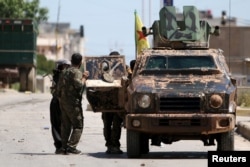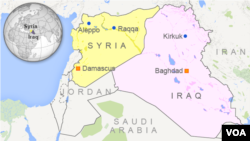While Turkey’s president says Ankara and Washington are discussing joint military action in Raqqa, the Syrian headquarters of the Islamic State group, Turkey’s options may be limited.
“It will not be a massive 30,000, 40,000 soldiers entering into Syria,” said Turkish political columnist Semih Idiz of the Al Monitor website. “I do not think the Turkish public is ready for that kind of involvement anyway. So it will be forces in the hundreds, with heavy artillery and air support. I think it will probably be more a force where the numbers are provided by Syrian fighters rather than Turkey."
Flying back from attending the Group of 20 summit in China, Turkish President Recep Tayyip Erdogan on Wednesday told reporters he had agreed to a proposal by his U.S. counterpart, Barack Obama, to work together to remove IS from Raqqa.
“Let our soldiers come together. Whatever is necessary will be done.” Erdogan said.
But the Turkish president was short on specifics and said any military role would depend on further talks.
Problematic route
Turkish armed forces backed by tanks and Free Syrian Army forces entered Syria last month to remove IS militants from near the Turkish border. Moving farther south, some 80 kilometers to Raqqa, would be problematic, because Turkish forces would need to pass through Kurdish territory.
The Turkish operation "Euphrates Shield" is also targeting the Syrian Kurdish militia of the YPG in northern Syria, which Ankara accuses of being linked to the outlawed PKK, which is fighting in Turkey.
But the YPG receives strong military support from the United States and is widely viewed as among the most effective forces against IS.
Gelo Issa, a YPG political official in northern Syria, told VOA that it was uncertain whether the U.S. would agree to anything other than Turkish air support in a Raqqa offensive. The YPG is seen as key to U.S. plans to recapture Raqqa, analysts say.
“Turkey can’t send its troops to Raqqa because it’s not a border area and Ankara can’t justify such an incursion as it did in [northern Syria],” he said. “I don’t think any Turkish involvement in the Raqqa campaign would change the equation for the Kurdish-led forces.”
Arab, Turkmen force
More than likely, Turkey would continue to enlist Syrian rebels, an Arab and Turkmen force it empowered in northern Syria, to take some part in the fight to free Raqqa, some analysts say.
People in Raqqa, struggling under IS control, would welcome any help in the liberation battle, according to Raqqa Is Being Slaughtered Silently, a rights group advocating the liberation of the city from IS.
“In the case of Raqqa, Turkey’s involvement is likely in the form of supporting the Free Syrian Army,” said Hussam Eisa, the group’s spokesman, speaking of the rebels. “That would be a welcome move by people in Raqqa.”
But Ankara could pay a high price in participating in an operation to oust Islamic State from Raqqa. Analysts warn that with thousands of jihadists in the densely populated city, it would most likely be a brutal fight. And Turkey would find itself deeply embroiled militarily in Syria’s civil war.
“A Turkish involvement in any other form would be similar to those of other countries in the Syrian conflict,” Eisa said.
Major commitment
That means Turkey could ultimately be forced to commit large numbers of its forces, said political columnist Kadri Gursel of the Cumhuriyet newspaper.
"Going down to the southeast to Raqqa will mean for Turkish armed forces a very, very long trajectory of logistical support,” Gursel said. “And there will be a need to pass through a corridor having Kurds on the east and Syrians [government forces] on the west and [IS] all the way the through. So this is very dangerous, and there is no exit strategy — and a war of attrition will be very costly for Turkish armed forces."
Still, Erdogan may be betting that Turkish participation will marginalize the effectiveness of Kurds in the region in the future, analysts say.
"The expectation is that the dependence that the Americans have on the ground on Kurdish forces will decline,” Idiz said. “And Turkey will also have a stronger say, at the proverbial Syrian table. So I think there is a political dimension also to what Erdogan is suggesting."






